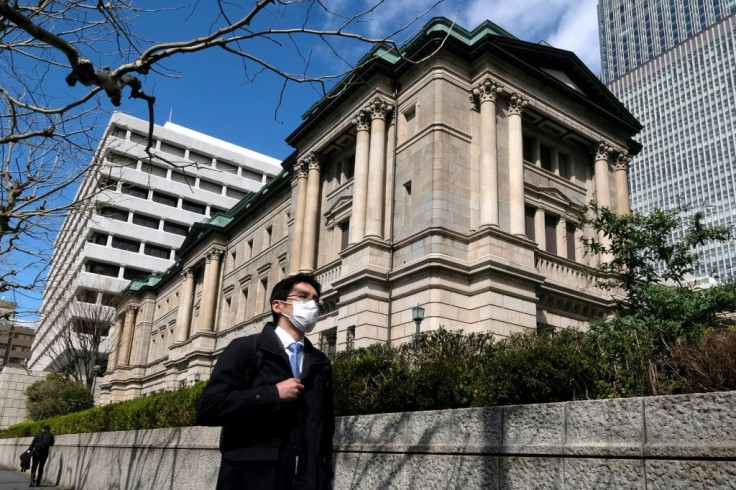Climate Change News: Amid Pandemic, Japan's Megabanks Must Lead On Sustainability

The path out of the current COVID-19 pandemic is still shifting, with long-term economic recovery perhaps even harder to predict. Massive amounts of money will be spent in the coming months in an attempt to recover from the economic lockdown and heavy human toll. But propping up business as usual will not work. For true recovery, we must take into account the ongoing climate and deforestation crises which, as the UN Environmental Programme (UNEP) has said, are exacerbating these deadly pandemics.
Among Asian banks, Singaporean banks have led the way toward needed change, adopting some of the strongest Environmental, Social, and Governance (ESG) policies that will limit financing toward the most disastrous projects in the energy and forest sectors. This is demonstrated by not only the exclusion of new coal power by DBS and OCBC, but also by the adoption of best practice ‘No Deforestation, No Peat, No Exploitation’ (NDPE) criteria by DBS, for at least its palm oil clients.
Deforestation is deadly for forest ecosystems and humanity alike, and the gravest impacts are in the tropics. As rainforest habitat is destroyed, new pathogens are more easily passed from wild animals to humans while biodiversity plummets. Deforestation also harms the climate: it’s the second-largest source of global carbon emissions, while reducing it could mitigate up to one-third of all emissions. And the threat of another slash-and-burn forest fire season looms large, which would bring with it the deadly trans-national haze and it's high rate of respiratory infection, leaving the region even more susceptible to the devastating effects of COVID-19.
Banks, it turns out, have a particularly significant role to play in these problems and their solutions.
While the Singaporean banks still lag behind some of their Western peers, over the past two years –– facing increasing public and investor pressure -–– Japan’s largest banks have also embraced stronger ESG policies like never before. Three of Japan’s largest banks –– Mitsubishi UFJ Financial Group (MUFG), Mizuho Financial Group (Mizuho), and Sumitomo Mitsui Financial Group (SMBC Group) –– have adopted policies that outline stricter guidelines for business dealings across multiple sectors, including coal and deforestation. The latest policy announcement from Mizuho, Japan’s second-largest bank, shows clearly that Japanese banks now recognize climate change as a risk that needs to be governed from the very top. SMBC Group and MUFG are not far behind and all three banks' decision to basically stop financing new coal power projects is very significant, but it's only half the story.
MUFG, Mizuho, and SMBC Group –– collectively known as megabanks –– remain some of the most significant lenders to industries driving rainforest and peatland destruction in Southeast Asia –– eliminating the earth’s most effective carbon sinks. All three also recently provided over a billion dollars in financing to the palm oil and pulp & paper divisions of the companies implicated in the 2019 forest fires that again devastated Indonesia and emitted more carbon than the sixth-largest global emitter. It’s encouraging to see that the megabanks now have policies on forestry and palm oil, with Mizuho now calling on forest sector clients to have NDPE policies and respect communities' Free, Prior and Informed Consent (FPIC), while threatening to suspend financing where “a client’s remedial measures [on social issues] are unsatisfactory.”
SMBC Group’s new policy prohibits the use of fire for deforestation and pledges to only finance palm oil if “forest resources and biodiversity are protected when new plantations are developed and there are no human rights violations.” Sadly, MUFG’s latest policy saw the bank fall behind it's global and domestic peers, but it still demands all forest sector clients to certify their operations.
As rainforest destruction doubles under the cover of the coronavirus, and global temperatures and sea levels continue to rise, the measures being taken by Japan’s megabanks are promising, but not enough. And no bank in Asia has yet to commit to a fossil fuel phase out that’s aligned with limiting global warming to 1.5ºC, nor have they committed to require full NDPE implementation and respect for FPIC by all clients complicit in deforestation.
This is not just about policy adoption. A policy is only as good as the implementation, and we don't have any more time for greenwashing. While Japan’s megabanks have promised to stop funding new coal power, they’re literally backing a new mega coal plant in Vietnam, which DBS and OCBC and even Standard Chartered have already rejected. And all three megabanks as well as DBS remain major funders of controversial companies like palm oil giant Indofood, known for deforestation, and human and labor rights abuses.
These financing practices must end if the banks care about their global reputation, human rights, and the future of the planet. It requires monitoring all clients involved in high-risk sectors, ensuring their business practices are complying with sustainability criteria, and having enforceable mechanisms like loan covenants to make it easier to demand corrective actions and divest if necessary. If the Japanese megabanks are serious about climate change and their commitments under the UN Principles for Responsible Banking, then they need to translate their commitments into action and stop funding fossil fuel expansion, deforestation, and human rights abuses now.
Hana Heineken, Senior Campaigner on Responsible Finance, Rainforest Action Network
© Copyright IBTimes 2024. All rights reserved.





















